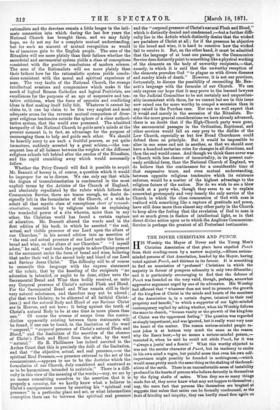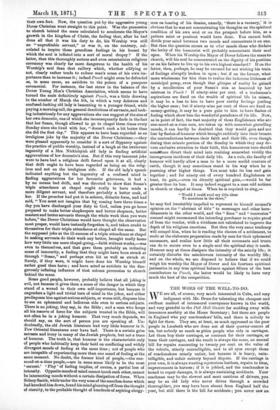THE DOVER CHRISTIANS AND PUNCH.
JIS the Mayor of Dover and the Young Men's Christian Association of that place have expelled Punch from their reading-room by a narrow majority, —fifteen serious- minded persons of that Association, headed by the Mayor, having voted against Punch, and thirteen in its favour. It is something to find an association of 'professed' Christians in which the majority in favour of pompons solemnity is only two-fifteenths; and it is particularly encouraging to find that the defence of Punch was founded on the very valid, though, perhaps, somewhat aggressive argument urged by one of its advocates. His Worship had affirmed that "whatever does not tend to promote the growth of the kingdom of Christ in the minds and hearts of the members of the Association is, in a certain degree, inimical to their real propriety and benefit," to which a supporter of our light-minded contemporary replied by asking whether, when his Worship follows the mace to church, "human vanity or the growth of the kingdom of Christ was the uppermost feeling." The question was regarded as simply impertinent, and was ignored, but it really went very near the heart of the matter. The reason serious-minded people re- sent jokes is at bottom very much the same as the reason why the Essex boor,—by no means a serious-minded person,— resented it, when he said he could not abide Punch, for it was "always a jeerin' and a fleerin'." What this worthy objected to was not the secular character of Punch, but its tendency to excite in his own mind a vague, but painful sense that even his own self- importance might possibly be founded in nothingness,—which would mean pretty much the same thing as the shaking of the found- ations of the earth. There is an uncomfortable sense of instability produced in the hearts of persons who believe devoutly in themselves by the flying shafts of satire. When they see so many things made fun of, they never know what may not happen to themselves ; nay, the mere fact that persons like themselves are laughed at suggests that unless that satire can be formally condemned, as the fruit of frivolity and iniquity, they can hardly stand firm again on their own feet. Now, the question put by the aggressive young Dover Christian went straight to this point. Was the procession to church behind the mace calculated to accelerate the Mayor's growth in the kingdom of Christ, the feeling that, after he had done all that it was his duty to do, his Worship was still an "unprofitable servant," or was it, on the contrary, cal- culated to inspire those grandiose feelings in his breast by which the soul is inflated into a sort of moral dropsy ? If the latter, then this thoroughly serious and even ostentatious religious ceremony was clearly far more dangerous to the health of his Worship's soul than that raillery which, whether edifying or not, clearly rather tends to reduce man's sense of his own im- portance than to increase it ; indeed Punch might even be defended as, in some sense, an antidote to the poison of a pompous ceremonial. For instance, the last straw in the balance of the Dover Young Men's Christian Association, which seems to have turned the scale definitively against Punch, was a little drawing in the number of Marcy the 4th, in which a very dolorous and confused-looking old lady is lamenting to a younger friend, while paying a morning call, the general derelictions of servants, and look- ing industriously for any aggravations she can suggest of the sins of her own domestic, one of which she inconsequently finds in the fact that her Susan, though allowed to go to chapel three times every Sunday since she lived with her, "doesn't cook a bit better than she did the first day." This appears to have been regarded as an irreligious joke by the majority of the Dover Christians ;—they were pleased apparently to consider it a sort of flippancy against the practice of public worship, instead of a laugh at the irrelevant ingenuity of a Mrs. Nicklebyish old lady in finding artificial aggravations of her domestic's sins. But if this very innocent joke were to have had a religious drift forced upon it at all, clearly that drift ought to have been regarded as being on the relig- ious and not on the irreligious side. If the old lady's speech indicated anything but the ingenuity of a confused mind in finding aggravations for her favourite grievance, it bad a by no means bad drift, and was directed to show that Susan's triple attendance at chapel ought really to have made a more diligent servant, and therefore probably a better cook, of her. If the preacher had put it in solemn, didactic form, and had said, "You must not imagine that by coming here three times a day you have discharged your duty to God, unless you go home prepared to make better shopkeepers and better shopmen, better masters and better servants through the whole week than you were before," the Dover Christians would have thought the observation most proper, would have instantly forgotten it, and taken credit to themselves for their triple attendance at chapel all the same. But the supposed joke at the ill-success of a triple attendance at chapel in making servants do their work any better, brought really home how very little use mere chapel-going,—faith without works,—was even to themselves, and that gave them probably an irritating sense of insecurity, a feeling that they might have been struck at through "Susan," and perhaps even hit as well as struck at. Surely, if they were, it might have done his Worship himself rather good than harm ; and have acted as antidote to the dan- gerously inflating influence of that solemn procession to church behind the mace.
Some good people, however, probably believe that all joking is evil, not because it gives them a sense of the danger in which they stand of a wound to their own self-importance, but because it engenders a light and trivial turn of mind in the joker, and either predisposes him against serious subjects, or worse still, disposes him to see an ephemeral and ludicrous side even to serious subjects. There is no joking, they say, in the Bible ; and a man who keeps all his reserve of force for the subjects treated in the Bible, will not often be in a joking humour. That very much depends, we should say, on the sort of person you are speaking of. Un- doubtedly, the old Jewish literature had very little humour in it. Few Oriental literatures ever have had. There is a certain grim sarcasm and irony in many of the Jewish prophets, but not a trace of humour. The truth is, that humour is the characteristic only of people who habitually keep their hold on conflicting and widely divergent moods of feeling at the same time ; not of people who are incapable of experiencing more than one mood of feeling at the same moment. No doubt, the former kind of people,—the one- mood-at-a-time people,—are in some sense likely to be the most earnest." Play ' of feeling implies, of course, a partial loss of intensity. Opposite moods of mind cannot touch each other, cannot be intersecting moods without a certain dissipation of force. When Sidney Smith, while-under the very nose of the omnibus-horse which had knocked him down, found his mind glancing off from the thought of eternity, to the probable thought of hundreds of aspiring clergy- men on hearing of his demise, namely, there is a vacancy,' it is obvious that he was not concentrating his thoughts on the spiritual condition of his own soul or on the prospect before him, as a pattern saint or penitent would have done. You cannot both divide your mind between two moods and concentrate it on one. But then the question occurs as to what moods those who disdain the levity of the humourist will probably concentrate their soul upon. When his Worship the Mayor of Dover follows the mace to church, will his soul be concentrated on the dignity of his position or on his failure to live up to his own highest standard ? If on tha latter, then, perhaps, he may be excused for not wishing his train of feelings abruptly broken in upon ; but if on the former, what more wholesome for him than to realize the ludicrous littleness of municipal pomp, even though that glimpse of reality be gained by a recollection of poor Susan's sins as lamented by her mistress in Punch? If ninety-nine per cent. of a tradesman's aspirations are fixed on the wealth of spiritual life he misses, it may be a loss to him to have poor earthy feelings jostling the higher ones ; but if ninety-nine per cent, of them are fixed on money-getting, it may be a pure gain to him to have flashes of feeling which show him the wonderful paradoxes of Hs life. Now, as in point of fact, the vast majority of those Englishmen who are one-mood-at-a-time men, are taken up with somewhat grovelling moods, it can hardly be doubted that they would gain and not lose by flashes of humour which brought suddenly into their breasts the contradictions between their faith and their life, even though• during that minute portion of the Sunday in which they may de- vote exclusive attention to their faith, this humourous turn should somstefuies divert their mind into realizing somewhat vividly the- incongruous incidents of their daily life. As a rule, the faculty of humour will hardly allow a man to be a mere sordid creature of earth, though it may sometimes stand in his way when he is yearning after higher things. You must take its loss and gain together ; and for ninety out of every hundred Englishmen at least, its gain,—even its directly spiritual gain,—would be far greater than its loss. It may indeed suggest to a man odd notions. in church or chapel at times. When he is required to sing,—
" Would I could read my title clear To mansions in the skies," he may feel irresistibly impelled to represent to himself counsel's opinion on the "abstract of title" to messuages and other here- ditaments in the other world, and the " fines " and "recoveries" counsel might recommend the intending purchaser to require proof of from the vendor, with a vividness not calculated to improve the depth of his religious emotions. But then the very same tendency will compel him, when he is reading the clauses of a settlement, to smile at the elaborate preparation made by men for their ephemeral successors, and realize how little all their covenants and trusts can do to secure even to a single soul the spiritual stay it needs. Humour may at times dissipate the intensity of the saintly life ; it certainly disturbs the mischievous intensity of the worldly life ; and on the whole, we are disposed to believe that if we could weigh his worship the Mayor of Dover and his fourteen spiritual janissaries in any true spiritual balance against fifteen of the best contributors to Punch, the latter would be likely to have very much the best of the competition.



































 Previous page
Previous page